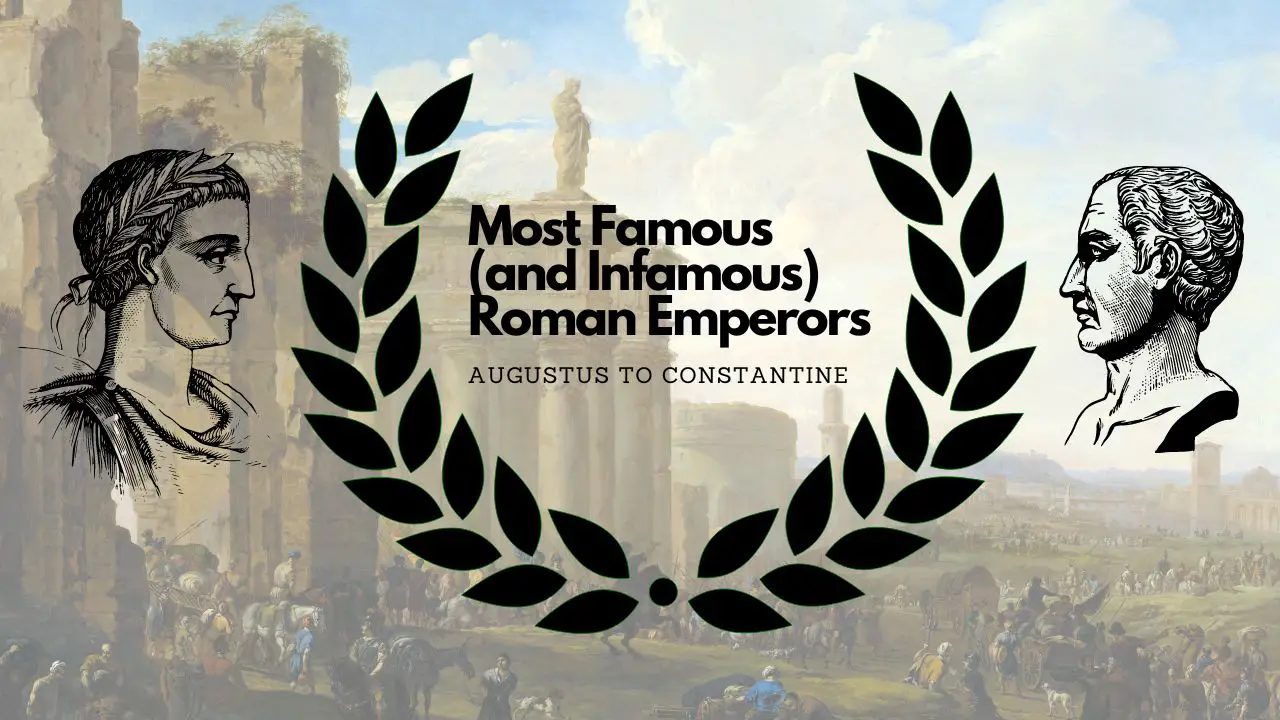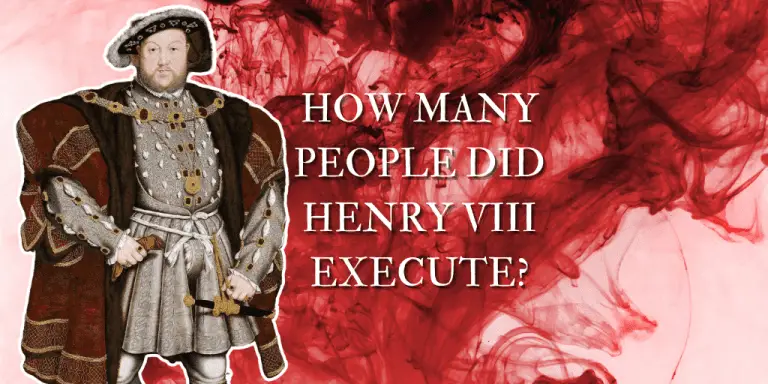15 of the Most Famous (and Infamous) Roman Emperors: From Augustus to Constantine
In 27 BC, the first granting of the title of emperor was bestowed on Octavian, from whence he was known as Augustus Octavian. During Rome’s imperial period, the emperor ruled over the Roman Empire, known by many titles through the eras. : basileus, caesar, princeps civitatis (‘first citizen’). Emperors often accumulated republican titles, too, such as princeps senatus, consul, and pontifex maximus. While emperors progressed to rule with the assistance of co-emperors with whom administration duties were shared. The first emperors reigned solo.
The Roman emperor needed to have both control of the army and recognition by the Senate. It was normal for troops to proclaim an emperor and for the emperor to be bestowed imperial titles by the Senate.
Augustus (born 23 September 63 BC—died 19 August AD 14)
The first Roman emperor was given the title Caesar Augustus, or Octavian orig. Gaius Octavius later Gaius Julius Caesar Octavianus. He was born into a wealthy family and had Julius Caesar as his great uncle. He became the adoptive son and heir of Julius Caesar when he was 18. When Caesar was tragically assassinated in 44BC, it gave rise to quite a power struggle and a good many battles. The end result was Octavian collaborating to form the Second Triumvirate with his main rivals, Lepidus and Mark Antony.
Octavian removed Lepidus as a problem in 32BC. Mark Antony had by this time allied with Cleopatra, but Octavian successfully disposed of him in 31BC at the Battle of Actium and went on to become sole ruler. His accession as princeps saw the birth of the Roman Empire over which he ruled as consul and maintained republican administration.
He took on the title of Augustus in 27BC and in 23BC, he received imperial power. During his reign between 31BC and AD 14, the Greco-Roman world saw peace and prosperity, and outlying imperial provinces were secured. He built roads, established public works, and nurtured the arts. His actions to establish Roman morality were so drastic as to extend to the exile of his daughter Julia for adultery. The Roman Empire included everything between Iberia and Cappadocia and between Gaul and Egypt at the time of his death, after which he was deified.
Trajan (born 8 September 53AD – died 9/11 August 117AD)
Caesar Divi Nervae Filius Nerva Traianus Optimus Augustus or Caesar Nerva Traianus Germanicus orig. Marcus Ulpius Traianus was the Roman emperor from 98 to 117AD. Before he became consul in 91AD, he had military commands in Asia and Europe. In 97, Nerva took him on as his successor. He deified Nerva after his death in 98AD, and Trajan declared himself Jupiter’s representative on earth.
Under Trajan’s rule, Dacia, Mesopotamia, and Parthia were added to the empire, taxes were reduced, the Senate gained new authority, the poor were supported by government welfare, and provincial administration was reformed. Trajan also built public works which included a forum with Trajan’s Column which was a structure commemorating his Dacian Wars. While campaigning in Asia, the conquered territories experienced riots. Trajan was returning to Rome, sick and disheartened when he died.
Hadrian (born 24 January 76 – died 10 July 138)
Hadrian became Latin Caesar Traianus Hadrianus Augustus orig. Publius Aelius Hadrianus, and was Roman emperor from 117 to 138. He succeeded Trajan who was also his uncle and saw many accomplishments during his reign. He abandoned Trajan’s conquests in Armenia and Mesopotamia, executed his senatorial opponents, and handled the unrest that was rife within Mauretania and Parthia.
He was well-traveled, seeing many successes during his visits abroad. He started construction on Hadrian’s Wall, completed the temple of Zeus in Athens, and created a federation of Greek cities. He visited troops in Algeria and elsewhere whom he also disciplined. He initiated a building program at Delphi and was inducted into the Eleusinian mysteries.
Hadrian had a young companion by the name of Antinoüs who drowned in the Nile. Hadrian did not hide the grief he felt at the boy’s passing and erected statues of him all through the realm. Antoninus Pius was the successor he named, who was later followed by Marcus Aurelius.
Marcus Aurelius (born 26 April 121 — died 17 March 180)
Caesar Marcus Aurelius Antoninus Augustus orig. Marcus Annius Verus was the Roman emperor from 161 to 180. Marcus Aurelius was born into a prominent, wealthy family. Hadrian saw to it that Antoninus Pius adopt Marcus and Lucius Verus. Marcus was dutifully groomed as his heir and on accession, he shared power with his adoptive brother as co-emperor.
Marcus may have been gentle and well-learned, but he opposed Christianity and supported the persecution of the followers of the religion. He provided a good insight into his religious and moral values in what is seen as one of the great books ever written, Meditations on Stoicism.
During his rule, all the major frontiers were threatened with invasion, and he reigned through many military crises. His troops successfully handled the struggles against the Parthians between 162 and 166, but on their return to Rome brought with them a devastating plague.
Combined with the hardship of the plague, Roman morale declined during the German invasion. Although the Germans were held off, Verus did not return from the campaign, succumbing in 169. Marcus assigned his son Commodus the position of co-emperor in 177. The reign of Marcus is believed to mark the Golden Age of Rome.
Aurelian (born c. 215—died 275)
Lucius Domitius Aurelianus was the Roman emperor between 270 and 275. He adopted the title of restitutor orbis or restorer of the world by reuniting the empire that had all but been destroyed by invasions and internal revolts. Around 260AD, he was an army officer when internal fragmentation of authority and outside pressure caused the sudden collapse of the frontiers of the empire. Claudius and Aurelian led the cavalry of the emperor Gallienus, with Claudius succeeding Gallienus as emperor after his assassination in 268. He reigned for only 18 months before he died, after which his brother Quintillus ruled for about three months before his demise. Aurelian succeeded as emperor in September 270.
Aurelian wasted no time in restoring Roman authority in Europe, turning the Vandals back from Pannonia, expelling the Alemanni and Juthungi from northern Italy, and chasing the Juthungi across the Danube. Back in Rome, he suppressed a revolt at the imperial mint. He instructed the construction of a new city wall around Rome to protect the city from attack. The wall bearing his name still stands today, in part.
For ten years up to 271, Aurelian attempted to gain the eastern provinces which recognized the princes of Palmyra as their rulers. After the successful siege of Palmyra, Septimia Zenobia was captured, being the regent for her son Wahballat, and the capital surrendered. Aurelian went on to march to the Danube and conquer the Carpi. In 273, Palmyra revolted yet again and it was recaptured and the city destroyed.
After confronting his rival emperor, Tetricus, in 274, controller of Gaul, Spain, and Britain, Aurelian and Tetricus concluded a secret treaty. This saw the vast empire ruled once more by a central authority. In light of this united empire, Aurelian withdrew Roman troops from Dacia in 274, and place soldiers and settlers south of the Danube as essential defensible boundaries.
Aurelian looked to create a religious unity by demeaning the empire’s many religions to the cult of the Unconquered Sun (Sol Invictus). The type of unity he sought eventually came to be under the rule of Constantine.
Aurelian was murdered by a group of officers early in 275, on the way to campaign against Persia. His widow, Ulpia Severina, governed for six months until the Senate appointed Marcus Claudius Tacitus to rule.
Gaius Julius Caesar (born 12/13 July 100 BC—died 15 March 44 BC)
Roman general, statesman, and dictator, Julius Caesar was born into a noble family and was quaestor and praetor before governing Farther Spain in 61–60. In 60, he, Pompey, and Marcus Licinius Crassus formed the First Triumvirate. He was elected consul in 59 and proconsul in Gaul and Illyria in 58. During the Gallic Wars, he invaded Britain and crossed the Rhine.
After the wars, the Senate instructed him to lay down his command, wary of his growing power, as was Pompey. Caesar was taken aback when the Senate refused to instruct Pompey to give up his command as well. In response, he went against protocol and precipitated the Roman Civil War by leading his army across the Rubicon River between Gaul and Italy in the year 49. Caesar followed Pompey when he ran from Italy. He defeated Pompey in 48 but Pompey ran away to Egypt, where he was murdered.
Once in Egypt, Caesar allied with Cleopatra both as a lover and militarily. In 46–45, he conquered Pompey’s supporters and the Romans named him dictator for life. In 44, he was offered and refused the crown in full knowledge that the Romans had a disdain for kings. While Caesar was instigating political and social reforms, conspirators led by Cassius and Brutus assassinated him on the ides of March in the Senate House.
Tiberius (born 16 November 42 BC—died 16 March 37 AD)
Tiberius Julius Caesar Augustus orig. Tiberius Claudius Nero was the Second Roman emperor, ruling between 14 and 37AD. Augustus married Tiberius’ mother, Livia Drusilla.
When he was just 22 years of age, he took his first military command, during which he recovered Roman legionary standards that were lost in Parthia decades before, and returned home a hero.
Tiberius was very much in love with his wife, whom he had to abandon in 12 BC to marry Julia, daughter of Augustus. He went into self-imposed exile in 6 BC, becoming an irate recluse on Rhodes. Augustus recalled Tiberius to be his heir after exiling his daughter Julia for promiscuity circa 4 BC.
He was an efficient emperor, instituting reforms with very few occasions for severity, one being the exiling of Rome’s Jewish population on a pretext. His son Drusus died under mysterious conditions, and he relocated to Capri in 27. Having shown a tendency towards violence, killing, and torturing, in 31, Tiberius became suspicious of Sejanus after he was made co-consul. These suspicions of Sejanus’ ambition saw Tiberius execute him, naming Caligula his heir. In 37, the Praetorian Guard killed Tiberius when he was on his sickbed having declared its support for Caligula.
Nero (born 15 December 37AD—died 9 June 68AD)
Nero Claudius Caesar Augustus Germanicus orig. Lucius Domitius Ahenobarbus was the Roman emperor from 54 to 68. Emperor Claudius married Nero’s mother, Agrippina the Younger, and adopted Nero, who took the throne following Claudius’ death. Seneca, his tutor, guided him together with Agrippina whom he eventually murdered, liberating himself from his advisers.
In 64 a fire reasonably suspected to have been lit under the instruction of Nero razed a good section of Rome. Nero persecuted the Christians, setting them up as scapegoats. He went on to build the garish palace, the Domus Aurea, on privately owned lands that had been confiscated. He murdered his wife, Octavia, and her successor, Poppaea, and instructed Seneca to kill himself, and he also executed those senators who raised criticisms against him.
Gaul and Spain saw revolts led by Galba, whose army declared him emperor. Nero was soon relegated to presumed insanity when he publicly performed theatrically and on his lyre which gave rise to disgust among his people. Having been condemned by the Senate, he committed suicide rather than face execution.
Valerian (emperor from 253 to 260)
Publius Licinius Valerianus was consul under Severus Alexander and initiated in part inducing the Senate to support Gordian I’s 238AD rebellion against the emperor Maximinus. It is believed that he was among the 20 consulars to defend Italy against the emperor. During Valerian’s command on the Upper Rhine under Emperor Gallus, he and the northern armies were called upon to help against the rival emperor Aemilian. They were not able to save Gallus but did avenge him.
Valerian then succeeded Gallus as emperor and vigorously renewed the persecution of the Christians taken up previously by Decius. He executed Bishop Cyprian of Carthage and Bishop Sixtus II of Rome, among many others.
Unable to control the entire empire, Valerian appointed Gallienus, his son, to reign over the West while he undertook to dampen the Persian invasion. He unsuccessfully tried to enter into negotiations with the Persian king Shāpūr I and was captured in June 260. He died in captivity.
Constantine the Great (born 27 February c. 280—died 22 May 337)
Constantine I, officially Flavius Valerius Constantinus was the first Roman emperor to profess Christianity.
Having been passed over as successor to the throne in favor of Licinius, his victory at the Milvian Bridge outside Rome in 312 saw him made emperor in the West. Legend has it that this is where he had the vision which saw him adopt Christianity. The story is that he saw a cross and the words in hoc signo vinces (“In this sign, conquer”).
In 313, he issued the Edict of Milan which granted tolerance to Christians. In the spirit of this enlightenment, he granted churches special privileges and land, convoked the Council of Nicaea, and opposed heresies – Donatism and Arianism in particular.
His defeat over Licinius, whom he had executed, saw him take over control of the East and become the sole emperor. Byzantium was renamed Constantinople and made the new capital city in 324. Just two years later, in 326, for reasons unknown, he had his wife and eldest son killed. After refusing to partake in a pagan rite that resulted in him earning the ire of the Romans, he never set foot in Rome again.
Christianity grew into what would be a world religion thanks to him, and he is revered as a saint in the Orthodox church.
Caligula (born 31 August 12—died 24 January 41)
Gaius Caesar Germanicus was the Roman emperor from 37 to 41AD, succeeding Tiberius. His name, Caligula, means Little Boot which was a nickname given to him by the soldiers of his father when he was a child.
He transferred the last legion under a senatorial proconsul in Africa to an imperial legate, a move that completed the emperor`s monopoly of army command. Blame was popularly laid on Tiberius for the deaths of Caligula’s father, Germanicus Julius Caesar, in 19 AD, his mother, Vipsania Agrippina, in 33, and his two elder brothers, Julius Caesar Nero in 31 and Drusus Caesar in 23 AD.
Caligula took on his father`s distinguished name, Gaius Caesar Germanicus. He was pretentious regarding matters of divinity and soon spent on frivolities all that Tiberius had accumulated in the state treasury.
His extravagant affection for his sister, Drusilla, saw her consecrated Diva Drusilla on her death in 38 AD, making her the first woman in Rome to be honoured in this way. He marched his army into Gaul early in 40 and plundered its people.
Four months after his return to Rome, in January 41, he was murdered by among others, Cassius Chaerea, tribune of the Praetorian guard, and Cornelius Sabinus, at the Palatine Games, and his wife and daughter were put to death.
Claudius (born 1 August 10 BC —died 13 October 54 AD)
Tiberius Claudius Caesar Augustus Germanicus orig. Tiberius Claudius Nero Germanicus was the Roman emperor between 41 and 54 AD. He was the nephew of Tiberius and was declared emperor unexpectedly following Caligula’s murder.
Claudius was sickly, unpleasant, clumsy, scholarly, and cruel toward senators and the equites. Of the histories he penned, none survive. His disdain for the upper classes was as renowned as his accommodation of the freedmen.
He was responsible for expanding the frontiers of the Roman Empire. He invaded Britain in 43, annexed Mauretania in northern Africa, Lycia in Asia Minor, and Thrace, and saw Judaea made a province. Urbanization grew under his influence and his spending on public works was unrestrained. In 48, he executed his third wife, Valeria Messalina, and married Agrippina the Younger who was his niece and the one who had Claudius name her son Nero heir instead of his own son. It is believed that Agrippina poisoned Claudius.
Vespasian (born 17 November 9AD—died 24 June 79AD
Caesar Vespasianus Augustus orig. Titus Flavius Vespasianus was the Roman emperor from 69 to 79AD. He founded the Flavian dynasty having been born to a humble family to go on to military glory in Britain Claudius awarded him a triumph and in 63 he was made proconsul of Africa. He reconquered all of Judaea but Jerusalem between 67 and 68, ceasing fighting when Nero died.
The legions proclaimed Vespasian emperor after Galba was murdered. Vitellius took the title in Cologne but Vespasian’s forces went on to defeat him in Italy. Vespasian was popular, living a simple life. Under his rule, provincial taxation was increased to settle debts incurred under Nero. He had the Temple of Peace built, began construction of the Colosseum, and reformed the army and Praetorian Guard. He ended the Jewish war in 70AD as well as the Rhineland revolt. He accumulated land in Germany and Britain and pacified Wales. His son Titus succeeded him.
Commodus (born 31 August 161—died 31 December 192)
Caesar Marcus Aurelius Commodus Antoninus Augustus, original name (until 180 CE) Lucius Aelius Aurelius Commodus was Roman emperor from 177 to 192. He was the sole emperor after 180. Under his rule, civil strife was rife and 84 years of stability and prosperity within the empire was upended.
In 177, he became co-ruler and heir to his father, the emperor Marcus Aurelius and joined his campaign against invading German tribes along the Danube. After Marcus died in March 180, Lucius came to terms with the Germans very quickly.
As sole emperor, Lucius changed his name to Marcus Aurelius Commodus Antoninus. In 182, a group of Roman senators, collaborating with Commodus’s sister Lucilla, conspired unsuccessfully to assassinate him. In response, Commodus executed a few of the leading senators, becoming an arbitrary and vicious leader thereafter. In 186, to appease the army, he had his chief minister executed, and three years later the minister’s successor was killed by a rioting crowd with Commodus turning a blind eye.
His mistress and two advisers took up the political reins and Commodus slipped into madness. He renamed Rome Colonia Commodiana (Colony of Commodus), and thought himself the god Hercules, fighting as a gladiator in the Roman arena and killing lions with a bow and arrow. He was strangled on December 31, 192, by a champion wrestler under orders of his advisers after he had announced his intention to assume the consulship, dressed as a gladiator. The city prefect Publius Helvius Pertinax was proclaimed emperor, soon dragging the empire into civil war.
Septimius Severus (born 11 April 145/146—died 4 February 211)
Lucius Septimius Severus Pertinax was the Roman emperor between 193 and 211. He became a member of the Senate circa. 173 and became consul in 190. When Commodus was murdered on New Year’s Eve of 192. He was the governor of Upper Pannonia, present-day Austria and Hungary, and commanded the largest army on the Danube River. He stood by when the Praetorian Guards murdered Commodus`s successor, Publius Helvius Pertinax in March 193, declared himself the avenger of Pertinax and marched on Rome.
Only days after Julianus was murdered in Rome on 1 June, Severus entered the city without resistance. He named his rival in Britain, Decimus Clodius Albinus, caesar or junior emperor by way of placation and then proceeded westward to confront Albinus, who had declared himself emperor. Back in Rome, Severus executed 30 or so of Albinus`s supporters within the Senate.
He decreased the number of legions under the control of each general to avert the possibility of a powerful military rival. Italian courts outside of Rome were put under the control of the praetorian prefect rather than senatorial jurisdiction. In 208, together with Caracalla and his younger son, Geta, he led an army to Britain to pacify the regions not under Roman rule. He succumbed to disease at Eboracum, but his descendants remained in power until 235.






